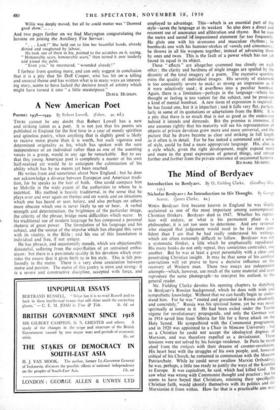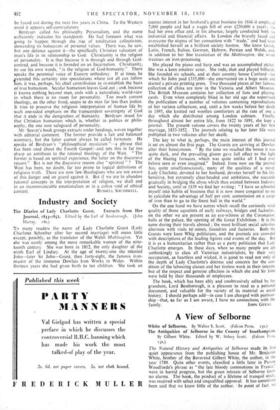The Mind of Berdyaev
WHEN Berdyaev first became known in England he was iFidely acclaimed as one of the most important among contemporary Christian thinkers. Berdyaev died in 1947. Whether his reputa- tion will endure, or what is his permanent place as a philosopher, it is yet too soon to determine. And any reviewer who essayed that judgement would need to be far more con- fident than I am that he had really understood his writings. which are often extremely difficult to follow. Berdyaev was not a systematic thinker, a title which he emphatically repudiated. His many books do not only repeat, they sometimes contradict, one another. But he was at least a great personality with a clear and penetrating Christian insight. It may be that some of his cardinal convictions will yet prove to have a decisive influence on the recovery of Western man. These two essays are independent attempts—which, however, use much of the same material and even reproduce the same photograph—to interpret his outlook to the generil reader.
Mr. Fielding Clarke devotes his opening chapters to sketching in Berdyaev's Russian background, which he does with wide and sympathetic knowledge. Without that we can hardly begin to under- stand him. For he was "rooted and grounded in Russia absolutely and concretely." Russia was his spiritual home, yet he was never spiritually at home in it. He had been exiled under the Tsarist regime for revolutionary propaganda, and only the German war in 1914 saved him from Siberia for life for a fierce attack on the Holy Synod. He sympathised with the Communist programme, and in 1920 was appointed to a Chair in Moscow University : but as a Christian he could not accept the ideological dogmas of Marxism, and was therefore expelled as a deviationist. These tensions were not solved by his foreign residence. In Paris he stood aloof from the emigres with their dreams of counter-revolution. His heart beat with the struggles of his own people, and, however critical of his Church, he remained in communion with the Moscow Patriarchate. While he could never swallow Marxist Orthodoxy, he was, perhaps, a little too ready to justify the ways of the Kremlin to Europe. It was capitalism, he said, which had killed God. He saw what was wrong with Communist thought and practice ; but he seems to have hoped that Christians, retaining their specifically Christian faith, would identify themselves with its politics and de- Marxianise it from within. How far that is a practicable aim may be found out during the next few years in China. To the Western mind it appears self-contradictory Berdyaev called his philosophy Personalism, and the name sufficiently indicates his standpoint. He had foreseen what was going to happen through the, rise., of totalitarian collectivism, demanding its holocausts of personal values. Thee was, he saw, but one defence against it—the specifically Christian valuation of man's life in its relationship to God. Christianity is the religion of personality. It is that because it is through and through God- centred, and because it is founded on an Incarnation. Christianity, to use his own words, "is the religion of God-humanity." There speaks the perennial voice of Eastern orthodoxy. If at times he ,Extended this certainty into speculations where not all can follow 'him, it was, perhaps, his chief contribution to re-establish the basis of true humanism. Secular humanism leaves God out ; and, because it knows nothing beyond man, ends with a naturalistic world-view in which there is no room for personality. Too much current theology, on the other hand, sews to d6 man far less than justice. It tries to preserve the religious interpretation of human life by such one-sided emphasis on the transcendent sovereignty of God that it ends in the denigration of humanity. Berdyaev stood for that Christian humanism which is,- whether in politics or philo- sophy, the one sure safeguard of personality. Mr. Seaver's book groups extracts under headings, woven together with editorial comment. The former provide a fair and balanced summary, but the latter cannot always be called fortunate. He speaks of Berdyaev's "philosophical mysticism "—a phrase that has been used about the Fourth Gospel—and sets this in far too sharp an antithesis to the rational theology of the West. "The former is based on spiritual experience, the latter on the discursive reason." But is not the discursive reason also " spiritual " ? The West has been, no doubt, far too prone to logical definitions of religious truth. There are now few theologians who are not aware of this danger and on guard against it. But if we are to abandon rational concepts in the interpretation of religion, we shall end in an incommunicable emotionalism or in a cultus void of ethical



















































 Previous page
Previous page